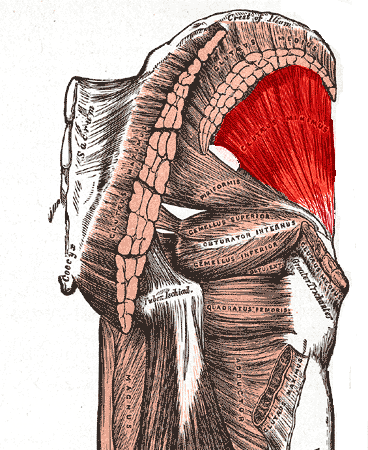You get up out of your chair and you have pain that radiates into the back of your leg. The pain accumulates most on the side of your thigh. You have heard about this pain before… It must be sciatica, or pain from the sciatic nerve. This is a common misconception for many people that experience similar pain.
Sciatica is often diagnosed (or misdiagnosed) for any patient or person that has pain that radiates into the back side of the thigh and leg. However, there are many things that can cause radiating pain into the back of the thigh and side of the thigh into the leg. Two of the most common are pain originating from the Sacroiliac Joint (SI Joint) and also pain from the Gluteus Minimus.
Gluteus Minimus – Gluteus Maximus’ little brother. This lesser known muscle may be responsible for your “sciatica”.
Poor posture, overuse or muscle imbalances can lead to trigger point formations (think of a muscle “knot” that causes pain locally and also radiates) in the Gluteus Minimus. This can lead to referral pain into the hip, buttock, thigh and even into the leg. The pattern of referral is often called “side-atica” or “pseudo-sciatica.” Please see the referral diagram.
The Gluteus Minimum has a very important function and is used every time you move. This muscle stabilizes the pelvis. When trigger points are present, you may feel pain into the thigh or leg with every step or you may feel this radiating pain when moving from a seated to standing position.
So, how do I know if my pain is coming from the Gluteus Minimus, SI Joint or from the Sciatic nerve?
If you are experiencing these pains you should give us a call. Active Release Technique (ART) is a great option for this type of pain. Don’t get misdiagnosed with sciatica when you may have “side-atica.”
What do we do for this?
We will do a physical exam to identify if this is actually causing your pain. After it is determined that the Gluteus minimus is the pain-causing agent, we will employ active release technique to break up the trigger point and adhesions. Afterword, corrective exercises and self-treatment techniques will be taught.
If you are experiencing these problems give us a call at (616) 532-2518.
Joshua L. Thorp, D.C.

